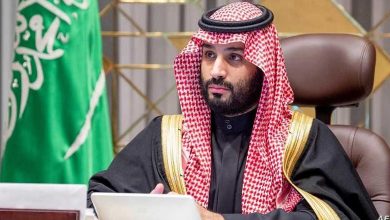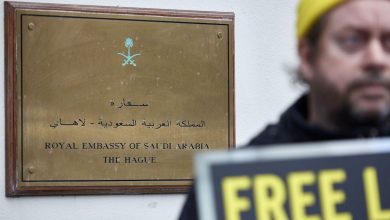DAWN: The U.S. should investigate Kushner’s business dealings with Mohammed bin Salman
A Two-Billion-Dollar Investment by the Saudi Government in the Kushner Investment Scheme "Affinity Partners" Raises Serious Conflict of Interest and Bribery Concerns.

In a letter sent today to U.S. Congress and the Department of Justice, Democracy for the Arab World Now (DAWN) urged an investigation into the troubling facts and circumstances surrounding the $2 billion investment of Saudi Arabia’s sovereign Public Investment Fund (P.I.F.) into Affinity Partners, established by former Trump White House adviser Jared Kushner.
Crown Prince Mohamed bin Salman’s (M.B.S.) decision to invest the Saudi government’s assets in Affinity Partners, despite the reported objections of the P.I.F.’s advisory board, and following Kushner’s close relationship and association with M.B.S. while Kushner was in office, raises serious concerns about illegal and unethical behaviour, including conflicts of interest, solicitation of foreign government officials while in office, and breaches of confidential national security information.
Sarah Leah Whitson, executive director of DAWN, stated, “President Biden has claimed that fighting corruption is one of his top global, national security priorities; he should begin by curbing the massive corruption and conflict of interest in our government caused by government officials who shamelessly sell their services to foreign governments once their term ends.” “Neither Biden nor anyone else can preserve American democracy if we allow legalized corruption to flourish within our own government.”
The U.S. Department of Justice and the U.S. Congress should investigate the solicitations made by Kushner, his agents, and Affinity Partners employees, including establishing a record of any and all communications they had with M.B.S. or any other individual regarding the fund, as well as the dates of these communications.
To determine whether U.S. federal laws and ethics rules restricting conflicts of interest, lobbying disclosures, and corruption have been violated. The investigation should include a comprehensive examination of the terms of any such investment and the promises and services made and to be made in exchange for this investment. On April 17, Senator Warren repeated calls for such a legislative probe, stating:
- I think there’s a question that the Department of Justice should take a really hard look to see if that fits within any of our current – I mean it is a kind of shaggy dog version of how you get to what is going on here – does it violate any of our criminal laws? And I’d want to take a hard look at that…. I think this is a moment where Congress needs to do a lot more about corruption.
The U.S. Congress should also commence attempts to establish legislation that prohibits all former government employees from working for, consulting, or recruiting foreign government officials or companies for at least five years after leaving government service. “Congress must act immediately to enact new conflict of interest rules prohibiting former government personnel with access to vital national security information from selling their services, expertise, and access to foreign governments,” said Whitson. “The absence of effective conflict of interest rules has created a significant and growing threat to U.S. national security, as former U.S. officials increasingly seek lucrative contracts with foreign countries to monetize their service for our country.”
The New York Times stated on April 10 that P.I.F. had invested $2 billion in Affinity Partners and looked to be the fund’s sole major investor, with only $500 million in further purported investments. According to the June 30, 2021 minutes of the P.I.F. advisory panel meeting obtained by The New York Times, the P.I.F.’s advisory panel rejected the Affinity Partners solicitation, citing “the inexperience of the Affinity Fund management”; the possibility that the kingdom would be responsible for “the majority of the investment and risk”; due diligence on the young firm’s operations that found them “unsatisfactory”; and a proposed asset management fee that “seems excessive.”
Despite these now-revealed misgivings, M.B.S. reportedly instructed the P.I.F., which he chairs as chairman, to proceed with the transaction, overriding the advisory council. The investment appears to be a reward for Kushner’s political support and protection of M.B.S. despite the crimes he committed in connection with the Yemen war and Khashoggi’s murder, as well as a political bet on “the Trump family’s political future — specifically, a possible White House comeback by Mr. Kushner’s father-in-law if he runs again and wins the 2024 presidential election.”
It appears that Kushner founded Affinity Partners in around July 2021. According to Reuters, the business has employed 20 employees, although Kushner and the great majority of the listed staff lack venture capital or equity capital investing experience. The “deck of cards” used to seek investment in the fund that DAWN got from a potential investor had no information about the fund’s investment strategy or intentions, referenced no investment track record, and displayed an organizational chart empty of names.
In addition, former Treasury Secretary of the Trump administration, Stephen Mnuchin, founded his own investment vehicle, Liberty Investment Fund, in which the Saudi government fund has invested $1 billion, prompting similar worries of a conflict of interest.
Jared Kushner was alleged to be the first Trump aide to build strong relations with M.B.S. prior to the election of President Trump. The Department of Justice has indicted Thomas Barrack as part of an investigation into illegal foreign government campaign donations and election activity by the United Arab Emirates on behalf of the Trump campaign.
Kushner reportedly coordinated M.B.S.’s March 2017 visit and dinner at the White House, followed by Trump’s trip to Riyadh. Prior to the murder of U.S. resident Jamal Khashoggi and the attempted murder of Saad Aljabri, a former Saudi official who had fled the country in the wake of M.B.S.’s deposing of former Crown Prince Mohamed bin Nayef, Kushner reportedly shared confidential national security information regarding the identities of Saudi nationals who had met with the State Department and Trump administration with M.B.S. (M.B.N.). Kushner is also rumoured to have supplied classified U.S. intelligence information with M.B.S. on M.B.N.’s attempt to remove M.B.S. as Crown Prince, following which M.B.S. jailed M.B.N. without trial in March 2020. M.B.N. remains incarcerated and has not communicated publicly since then.
Following the murder of Jamal Khashoggi by M.B.S. and his agents on October 3, 2018, Kushner reportedly counselled M.B.S. on how to handle the political and public relations fallout from the murder and continued to violate White House rules requiring National Security Council staff to participate in any meetings with foreign government officials through continued private calls with M.B.S. After Khashoggi’s assassination, President Trump boasted to veteran journalist Bob Woodward that he had “saved his ass” in reference to M.B.S. Kushner allegedly orchestrated a $110 billion arms sale to Saudi Arabia and remained a staunch defender of M.B.S. and continued arms deliveries to the Kingdom despite two bipartisan Congressional resolutions to halt arms sales for the Kingdom’s war in Yemen.
U.S. laws restricting the solicitation or employment of foreign government officials and entities after a federal employee has left office are woefully inadequate, and there appear to be no laws prohibiting former officials outside of intelligence agencies from working or conducting business for foreign governments.
President Biden signed the 2022 Intelligence Authorization Act on March 15, 2022, with provisions prohibiting U.S. intelligence agents with knowledge of national security interests and spycraft from the Central Intelligence Agency, the National Security Agency, and the more than a dozen other American intelligence agencies from selling their services to foreign governments for at least 30 months following the end of their federal employment, as well as requiring them to reapply for security clearances.
Members of Congress proposed the legislation in response to a crisis in intelligence and “spycraft” leaks linked to U.S. intelligence agents working for foreign governments, particularly National Security Agency officials who worked for the U.A.E. government and shared surveillance technology and techniques with them, including hacking hundreds of phones and spying on journalists, dissidents, and U.S. citizens in “Project Raven”. The Justice Department also successfully prosecuted former intelligence officers for their participation in this surveillance.
There are, however, rigorous restrictions under 5 C.F.R. 2635 Standards of Ethical Conduct for the Employees of the Federal Branch addressing conversations and negotiations of U.S. government officials for future employment or business that require disclosure and recusal while working for the U.S. government. Unfortunately, the only restrictions on future employment are restricted limits on communications and appearances before the U.S. government on behalf of the new employer.
“The Justice Department and Congress have an obligation to examine exactly when and how Kushner acquired $2 billion from the Saudi government coffers controlled by his close buddy, Crown Prince Mohamed bin Salman,” said Whitson. “Kushner’s actions may violate our already lax ethical regulations.” However, the true challenge for Congress is to eliminate the awful incentives that the absence of comprehensive conflict of interest rules has created, which allow wealthy tyrants to purchase American politicians.





